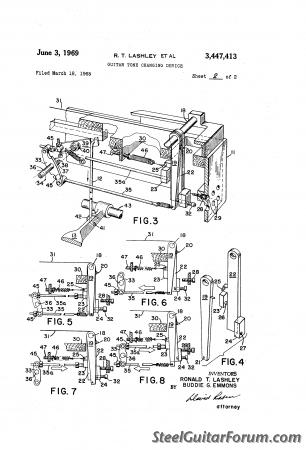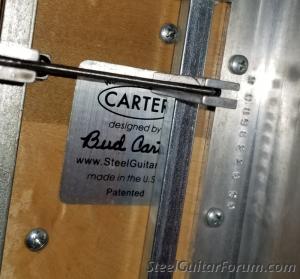| Author |
Topic: Curiosity- are steel guitar designs patented? |
Dave Stroud
From:
Texas
|
 Posted 12 Feb 2018 6:46 pm
Posted 12 Feb 2018 6:46 pm |
|
I don't want to turn this into another dreadful thread about tone, but I will say- all things equal- each steel guitar brand has its own distinctive sound, with some brands being more similar to each other than others. Regardless of amp choice and other factors, there is a "Zum" sound, a "Franklin" sound, etc....
I'm not suggesting that anyone copy the works of a Zum or a Franklin guitar (and I'm certainly not planning on it), but has any builder really striven to exemplify some of the best qualities of a Zum or Franklin in their own builds? Or are they coming up with their own ideas (which is also a noble cause)?
Are there patents or moral issues that prevent someone from building upon the work of a retired builder? It's disappointing that all my favorite studio artists only use steels that are no longer in production. |
|
|
 |
Pete Burak
From:
Portland, OR USA
|
 Posted 12 Feb 2018 7:25 pm
Posted 12 Feb 2018 7:25 pm |
|
I recall Carter Steel Guitars patented their BCT system.
Body Contact Technology.
It was based on the raise finger contacting the body, ala Emmons Push-Pull system. |
|
|
 |
Darvin Willhoite
From:
Roxton, Tx. USA
|
 Posted 12 Feb 2018 7:48 pm
Posted 12 Feb 2018 7:48 pm |
|
I think Bill Rudolph has a patent on the Williams changer.
_________________
Darvin Willhoite
MSA Millennium, Legend, and Studio Pro, Reese's restored Universal Direction guitar, a restored MSA Classic SS, several amps, new and old, and a Kemper Powerhead that I am really liking. Also a Zum D10, a Mullen RP, and a restored Rose S10, named the "Blue Bird". Also, I have acquired and restored the plexiglass D10 MSA Classic that was built as a demo in the early '70s. I also have a '74 lacquer P/P, with wood necks, and a showroom condition Sho-Bud Super Pro. |
|
|
 |
Jim Cohen
From:
Philadelphia, PA
|
|
|
 |
Dan Robinson
From:
Colorado, USA
|
 Posted 12 Feb 2018 9:40 pm
Posted 12 Feb 2018 9:40 pm |
|
Ron Lashley's 1969 patent, filed in 1965.
http://www.google.com.pg/patents/US3447413

I remember reading that Buddy had a "celebration" every year about this 
Maybe Ernie will comment.
Last edited by Dan Robinson on 12 Feb 2018 10:11 pm; edited 2 times in total |
|
|
 |
Dan Robinson
From:
Colorado, USA
|
 Posted 12 Feb 2018 9:45 pm
Posted 12 Feb 2018 9:45 pm |
|
| Pete Burak wrote: |
I recall Carter Steel Guitars patented their BCT system.
Body Contact Technology.
It was based on the raise finger contacting the body, ala Emmons Push-Pull system. |
From my 2008 SD-10.

Some older BCT Carters say "Patent Pending." |
|
|
 |
Per Berner
From:
Skovde, Sweden
|
 Posted 12 Feb 2018 11:04 pm
Posted 12 Feb 2018 11:04 pm |
|
| How long patent rights last vary from country to country, but typically somewhere around 15-20 years. So most steel guitar related patents will have run out by now, I guess. |
|
|
 |
Darvin Willhoite
From:
Roxton, Tx. USA
|
 Posted 13 Feb 2018 4:43 am
Posted 13 Feb 2018 4:43 am |
|
Several years ago when I was involved in my last patent for a mechanical powertrain for a chain type trencher, the patents had to be renewed every 5 years, and were good for 20 years. We had to pay a "maintenance fee" every 5 years to renew it, and that amount was set by someone who knew nothing about the machines, but made a guess as to what the profits might be from the sales of these machines, then the maintenance fee was a percentage of that. We renewed it a couple of times then let it lapse because the fees were more than the money we were making with the machines.
_________________
Darvin Willhoite
MSA Millennium, Legend, and Studio Pro, Reese's restored Universal Direction guitar, a restored MSA Classic SS, several amps, new and old, and a Kemper Powerhead that I am really liking. Also a Zum D10, a Mullen RP, and a restored Rose S10, named the "Blue Bird". Also, I have acquired and restored the plexiglass D10 MSA Classic that was built as a demo in the early '70s. I also have a '74 lacquer P/P, with wood necks, and a showroom condition Sho-Bud Super Pro. |
|
|
 |
Donny Hinson
From:
Glen Burnie, Md. U.S.A.
|
 Posted 13 Feb 2018 6:19 am
Posted 13 Feb 2018 6:19 am |
|
Pedal steels are more just a combination of simple mechanical devices than instruments, so most of the concepts have already been used many times. Some different designs, like Buddy's push-pull, may have been developed because there were mechanical patents still in effect. At any rate, as others have said, most all patents related to pedal steel have now expired and are free to be copied.
I find it strange that devices (useful inventions that can sometimes transform a society) can only have rights assigned for 20 years. Whereas, songs and music are now protected and have rights that extend, generally, for 95 years. Convoluted logic, to be sure, but that's where we are in today's society. |
|
|
 |
Jack Strayhorn
From:
Winston-Salem, NC
|
 Posted 13 Feb 2018 8:28 am
Posted 13 Feb 2018 8:28 am |
|
| The Emmons LeGrande changer was patented and the attorney was clever because it was more than the physical traits but also the wording describing operation. A person couldn't merely reconfigure because it covered the exact pivoting functions. |
|
|
 |
Herb Steiner
From:
Spicewood TX 78669
|
 Posted 13 Feb 2018 8:28 am
Posted 13 Feb 2018 8:28 am |
|
I'm not an attorney (much to the dismay of my deceased parents), but I believe a design can be trademarked, and defended if another manufacturer creates an instrument so close that a consumer might be confused as to which brand he was purchasing.
Examples I can think of involve Japanese companies in the 70's when Fender and Martin guitars were being knocked off overseas. Also the rather disingenuous lawsuit Gibson initiated with PRS over pickup configuration, which I believe Gibson lost. Also, Gretsch has threatened lawsuits over copies of Bigsby spanish guitars and use of the name "Bigsby."
Nowadays, they're all off the reservation and I think copying Gibson and Fender instruments is now de riguer.
_________________
My rig: Infinity and Telonics.
Son, we live in a world with walls, and those walls have to be guarded by men with steel guitars. Who's gonna do it? You? You, Lt. Weinberg? |
|
|
 |
Danny Letz
From:
Old Glory,Texas, USA 79540
|
 Posted 13 Feb 2018 4:07 pm
Posted 13 Feb 2018 4:07 pm |
|
| I think, according to his book, Bruce Zumsteg patented his Hybrid changer. |
|
|
 |
Bob Moore
From:
N. Rose, New York
|
 Posted 13 Feb 2018 4:16 pm Bct
Posted 13 Feb 2018 4:16 pm Bct |
|
| How does one know if you have it on a Carter. I have also a 2008 SD10. Bob M |
|
|
 |
Bill C. Buntin
|
 Posted 13 Feb 2018 4:16 pm
Posted 13 Feb 2018 4:16 pm |
|
Paul Sr. has a patent on his compensators maybe?? (I think) but don't remember for certain. I thought Bud Carter also registered the original all pull changer he developed. I believe, this is where I learned Bud Carter's REAL first name, when I saw that patent.
Thats some trivia. I knew Bud for nearly 20 years before I ever knew his real name.
Bill |
|
|
 |
Jim Sliff
From:
Lawndale California, USA
|
 Posted 13 Feb 2018 4:50 pm
Posted 13 Feb 2018 4:50 pm |
|
| Quote: |
| Quote: |
| I find it strange that devices (useful inventions that can sometimes transform a society) can only have rights assigned for 20 years. Whereas, songs and music are now protected and have rights that extend, generally, for 95 years. Convoluted logic, to be sure, but that's where we are in today's society. |
What I understand about that (very basic knowledge I got from a patent and copyright attorney years ago) is that songs can be "forever" (ignoring that some styles change); machines are often improved and updated.
Rights covering "devices" are generally shorter because the designs have comparatively brief "useful lives". |
_________________
No chops, but great tone
1930's/40's Rickenbacher/Rickenbacker 6&8 string lap steels
1921 Weissenborn Style 2; Hilo&Schireson hollownecks
Appalachian, Regal & Dobro squarenecks
1959 Fender 400 9+2 B6;1960's Fender 800 3+3+2; 1948 Fender Dual-8 Professional |
|
|
 |
Dan Robinson
From:
Colorado, USA
|
|
|
 |
Jim Pitman
From:
Waterbury Ctr. VT 05677 USA
|
 Posted 13 Feb 2018 6:11 pm
Posted 13 Feb 2018 6:11 pm |
|
| Dave, the steel guitar in your photo has a patent. Jerry patented the puller fingers. Their novelty is that they are inexpensive to manufacture being made from a simple flat stamping formed into a more complex 3D object. I helped him write the patent claims and drew the diagram. |
|
|
 |
Donny Hinson
From:
Glen Burnie, Md. U.S.A.
|
 Posted 13 Feb 2018 7:02 pm
Posted 13 Feb 2018 7:02 pm |
|
| Herb Steiner wrote: |
I'm not an attorney (much to the dismay of my deceased parents), but I believe a design can be trademarked, and defended if another manufacturer creates an instrument so close that a consumer might be confused as to which brand he was purchasing.
Examples I can think of involve Japanese companies in the 70's when Fender and Martin guitars were being knocked off overseas. Also the rather disingenuous lawsuit Gibson initiated with PRS over pickup configuration, which I believe Gibson lost. Also, Gretsch has threatened lawsuits over copies of Bigsby spanish guitars and use of the name "Bigsby."
|
From what I've read, brand names (such as "Bigsby") and proprietary fonts are covered by trademark laws, not by copyrights or design patents. Also, a design patent is specifically protecting the aesthetics, or purely the appearance of an object or device. So, something like a pedal or endplate (or Tele body shape) could be protected because of how it looks. However, it seems that anything on the underside of a pedal steel (the changer, rod hookups and other attachments) could not be covered by a design patent because they are not normally visible. Those parts would be covered under a utility patent. (See below, italics are mine.) Also, it appears patents cannot be renewed. Design patents are good for 14 years, and utility patents for 20 years. End of story.
| Quote: |
| To qualify for a design patent, the subject must be new in the sense that no single, identical design exists in the prior art, it must satisfy the ornamental standards, and it must be original to the inventor or inventors seeking protection. It must also be unobvious on the basis of any previously existing design or combination of designs when viewed through the eyes of a hypothetical designer skilled in the art. Further, design patents cannot be obtained for ornamental features that are not visible when the product is in use. In general, a design patent is obtained for the aesthetically appealing features of a product. It has also been stated that the subject must be a product of aesthetic skill and artistic conception. |
Interesting stuff; I hope we answered the OP's question. |
|
|
 |




